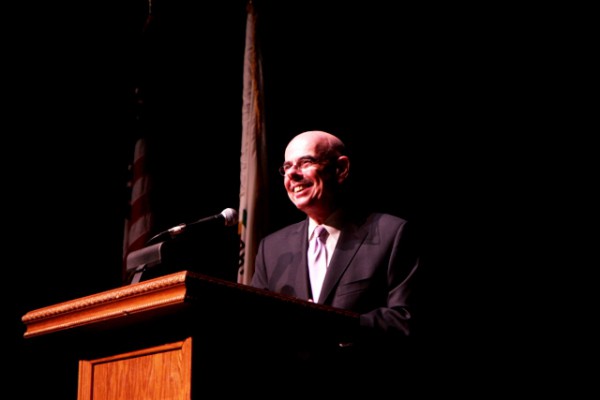Candidates Ted Lieu and Elan Carr vie for the congressional seat being vacated by Henry Waxman


They are relatively small large shoes to fill.
Henry Waxman, who is 5-foot-5, was elected in 1975 to represent the 33rd Congressional District. It included West Los Angeles, West Hollywood, Beverly Hills and Santa Monica. In 2012, redistricting expanded his district west, to include the Los Angeles County coastline from the Palos Verdes Peninsula to Malibu. But he still maintained much of his original base.
During his nearly four decades in Congress, Waxman burnished his legislative credentials with groundbreaking legislation such as the Clean Air Act (1990), the opening of markets for generic drugs (Hatch Waxman Act) and the Affordable Care Act.
He built his long and distinguished list of legislation when Democrats and Republicans actually worked together. It was built from longevity, which enabled Waxman to chair important committees. It was built from a knowledge base of how to get things done.
When Waxman announced his retirement late last year, it was as if the locks of a dam had been opened. Eighteen candidates appeared on the June 3 ballot for Waxman’s 33rd Congressional Seat. They included former Los Angeles City Controller and mayoral candidate Wendy Greuel, celebrity author Marianne Williamson and National Public Radio host Matt Miller.
Two relatively low profile candidates survived the primary and moved on to the November 4. Placing first was Republican Elan Carr, 45, a Deputy Los Angeles County District Attorney from West Los Angeles. Placing second was Democrat Ted Lieu, also 45, a State Senator from Torrance..
The 33rd Congressional district is the second richest in the U. S., surpassed only by New York’s 12th on the Upper East Side of Manhattan. The 33rd is less ethnically diverse than the rest of Southern California, with high percentages of White and Asian voters.
Carr and Lieu have similar family histories. Their parents were immigrants who left difficult situations and made successes of themselves in the United States. Both served in the armed forces in the JAG Corps, Carr in the Army, Lieu in the Air Force.
They entered public service in different ways, Carr as a deputy LA County District Attorney, Lieu as a Torrance City Councilman, State Assembly member and currently a State Senator. This is Carr’s first run for elective office.
No matter which one wins, the district will be represented by someone without the clout of a 40 year veteran. Lieu said this well-educated, sophisticated district won’t immediately expect what they could get from Waxman. However, he believes that the skills he developed in the State Legislature, where he co-authored bills with Republicans, will serve him well.
Carr, too, understands that the district is in for a change, but that “being in the majority party will help me get things done that those in the minority can’t.” He also said he believes that the 33rd is not just any district.
The next Congressman will be entering a body that has approval ratings in the single digits. Each believes that a new crop of freshmen will have an opportunity to change that. “It’s about the culture,” Carr said. “Freshmen could be a catalyst for change.”
But, Congress is a hierarchical, seniority-driven institution and the leadership seems to be locked in for battle more than for compromise. While Lieu believes that, for example, most of the members of both parties would vote for immigration reform, “Speaker Boehner is a captive of the Tea Party,” he said. “So, it hasn’t happened.”
Carr looks to the newly elected second in command, Californian Kevin McCarthy as a better example of Republican leadership. “McCarthy has heard the frustration and is sincerely establishing ties to the Democrats. He walks the walk of bi-partisanship.”
While not criticizing his potential leadership, Lieu said, “When I disagreed (in the Legislature) with the leaders, I said so. I supported redistricting reform when both parties opposed it. I supported the open primary, when they opposed it.”
Their experiences in the military have made them acutely aware of events around the world. “We have an amazing military,” Lieu said. “We are excellent at defeating another military force. But we are not good at asking the next question.” He cited Iraq and Libya as examples. “So, America has become skeptical of military intervention if you can’t answer that ‘what’s next?’ question.”
Carr said America’s policy should be to support democratization. “We can put Band-Aids on it,” he said. “But, at the end of the day, real democracy must prevail.” He blames most of the problems in the Middle East on Iran. “The two best chances for real democracy, in Iraq and Lebanon, were sabotaged by Iran.”
The rise of Asia as an important element of our foreign policy produced very different responses from the two candidates. For Lieu, who was born in Taiwan, what is going on in Hong Kong is of particular interest. “If they (the Chinese government) use violence, we should use forceful diplomatic action to exert pressure on them. But, I certainly hope they don’t.”
Lieu added, “We focus a lot on the Middle East, and rightfully so. But, it is clear to me that this will be the Pacific Century. Not just China, but Korea and even, extending it to India. California is our gateway to Asia.”
To Carr, any shift toward Asia is to imply that we can neglect other parts of the world. “American leadership (everywhere) is critical for our own security and safety. We have to focus on every region.”
Both expressed strong support for Israel, especially its right to defend itself against the attacks launched at it from Gaza in recent months. “Israel is a profoundly unique ally,” Lieu said. “It is a bulwark against terrorism.”
For Carr, whose family fled Iraq to Israel before coming to the U. S., the situation is very personal. “I am so dismayed about the Middle East. Israel is still the only democracy there,” he said.
The domestic agenda also provides differences between the candidates. Lieu says he is “100 percent pro-choice,” including allowing Federal funding for abortions. Carr disagrees. He says that he is “sympathetic with women making healthcare decisions.” He feels that Republicans have hurt themselves by constantly trying to overturn what he calls a done deal. “The Supreme Court has spoken. I will not support any legislation and certainly not an Amendment (to ban abortions).”
But he does not believe Federal funds should be used to help pay for abortions. “When an issue like this, with great controversy and moral perspective (is decided,) you need to have respect for each other. People who support abortion need to be sensitive to this.”
When asked whether decisions such as going to war, which many people find morally offensive, should be put to the same standard, Carr said, “No. Those are issues of much broader national interest. It shouldn’t be determined by polling.”
He did offer another example of where Federal money was misspent, however. He cited the support by the National Endowment of the Arts in 1989 of an exhibit of photographs by Robert Mapplethorpe at the Corcoran Gallery in Washington, D. C. “They should not have supported Mapplethorpe with Federal money.”
Both see the Affordable Care Act (Obamacare) as a permanent fixture. They also see it as unfinished business, with differing levels of work being necessary. All of the votes taken to repeal have been “posturing and destructive,” according to Carr. Providing examples of potential changes, he said, “I believe that we should delink insurance from employment and allow purchasing across state lines.”
Immigration is of more than casual interest to the two candidates. Lieu supports the existing plan, put forward by the U. S. Senate, calling for greater border security and a pathway to citizenship for people already here, particularly for so-called “Dreamers” who came to the U. S. as young children; and for those in high technology, many of whom went to school here and are forced back to their countries upon graduation.
Carr believes in a “humane and sensible approach for the undocumented, many of whom are hard-working and patriotic.” He said it is “hypocritical to maintain porous and open borders and then be outraged that people have come here. Border security is a public safety issue.”
Education is an area where the two candidates present the most similar positions. Both see Federal involvement to be primarily financial, leaving decision-making to states and localities. According to Lieu, “The No Child Left Behind program was focused too strongly on testing.” He voted in the State Legislature to end second grade testing. “We asked the wrong question,” he said, indicating that kids are intelligent in different ways at that age. “We should not be asking how smart is the kid, but how is the kid smart?”
Carr said, “There is definitely a role for national standards on education.” He favors local control since “it is the only way to have efficiency.” However, he believes that some problems have national implications because, with greater mobility, kids often move to different educational environments. “We should appropriate money in smart ways with local decisions under Federal guidelines. There’s nothing wrong with Federal earmarks.”
For Carr to win, he must reach out to Democrats, who make up the majority of the District. He says he has been making “very strong inroads.” Lieu, who has received the endorsement of the retiring Waxman, isn’t relying on the numbers. “I’m working very hard. I want the opportunity to continue that legacy.”
On November 4, one of them will start filling those shoes of the diminutive giant.











